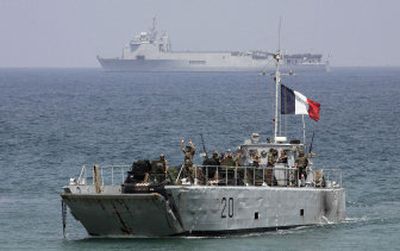U.N. forces face volatile situation in Lebanon

MARJAYOUN, Lebanon – The new international force expected to monitor the Lebanese-Israeli border will enter a highly ambiguous and volatile landscape, illustrated by the front-line experience of an Indian battalion that’s found little peace to keep after being caught in the middle of the war between Israel and Hezbollah militants.
More than 150 French military engineers arrived in Lebanon on Friday to search for unexploded munitions, and the European Union pledged to supply half of the 15,000 peacekeepers called for in the fragile truce agreement between the warring parties.
But putting more boots on the ground isn’t insurance against another explosion in a place teeming with land mines, both literal and figurative.
“It’s a very difficult role for a military person. Your hands are tied,” said Maj. Saurabh Pandey, the spokesman for India’s 4th Battalion, Sikh Regiment, which is part of UNIFIL, the U.N. peacekeeping mission already in Lebanon. “We are combatants. We have all been trained to fight, but here we are just here to see.”
It’s still unclear what precisely the mandate will be for the new U.N. troops, of which 2,000 will be French and 3,000 Italian. Hassan Saqlawi, a UNIFIL spokesman in the port city of Nakoura, where the first French contingent arrived aboard six vessels, offered this assessment: “We are not going to replace the government. Our job is to assist the Lebanese government to come back to power here.”
Few understand the difficulty of such a task better than the 4th Battalion, whose 700 troops make up half the combat component of UNIFIL.
The combat label is a stretch – the Indians are simply monitors who record violations along the so-called “blue line” that divides the craggy hills of southern Lebanon from the lush greenery of northern Israel. Their headquarters lies in Marjayoun, a predominantly Christian town separated from Israel by a flimsy barbed-wire fence.
Until the conflict began July 12 with Hezbollah’s abduction of two Israeli soldiers, the Indian troops considered themselves neutral observers.
Then, overnight, the peacekeepers found themselves embroiled in war.
“July 12 came, and we were slapped,” Pandey said, flipping through the pages of his diary. “See, I wrote ‘two missiles fired.’ And later, ‘down in bunker.’ Then I wrote about the first casualties, the destruction and now the humanitarian relief.”
A hilltop position in the village of Houla underscores the high price for using U.N. forces as a buffer. The Indian post there was the sole barrier between a massive, heavily guarded Israeli position on one side and, not even 500 feet away, crudely dug Hezbollah trenches on the other.
In the first week of fighting, Israeli tank shells destroyed part of the Indians’ barracks and nearly pierced through the heavy sandbags that enclosed a bunker where 20 peacekeepers sought shelter. Travel became so dangerous that the trapped Indians were down to one onion and four potatoes before a rations truck made a risky trip to deliver food.
Hezbollah’s rocket volleys whizzed dangerously close, and the Indians marveled at the arsenal the militant group had assembled virtually in secret.
“They were firing 150 rockets every day,” Pandey said. “Heaven knows where they came from or how they came.”
By the time the U.N.-brokered cease-fire was in place, three Indian peacekeepers had been wounded and several of their posts heavily damaged. Throughout the ordeal, Indian officers said, their troops didn’t fire a single shot. According to their mandate, they weren’t allowed to.
“That’s what the discipline of a soldier is. You can’t go berserk because of the difficulty of the circumstances,” said Lt. Col. Maninder S. Chahal, deputy commander of the Indian battalion.